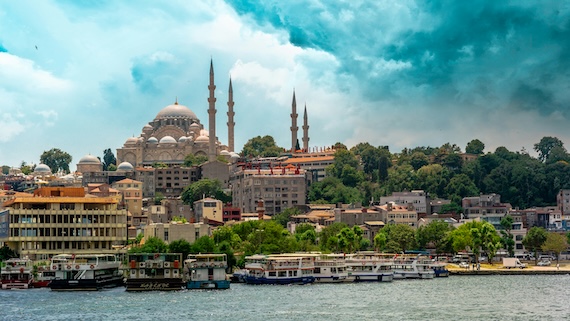By Ezgi Unsal, SOAS, University of London
(The Conversation) – In a break from tradition, the next major UN climate summit will be hosted by Turkey but chaired by a different country, Australia. This is the first split arrangement in three decades of these summits, known as “Cops”. The unusual deal, devised to avoid diplomatic tension, highlights new alliances to fight climate change globally.
Cop31 will take place late next year in the Mediterranean city of Antalya. While a representative from Turkey will be formally elected as “the president”, Australia will appoint a vice-president to lead the negotiations.
The agreement was reached after almost a full year of stalemate, as both countries had refused to withdraw their bids to host. Turkey had previously stepped back from its bid to host Cop26, which ultimately took place in Glasgow in 2021. For this reason, it was determined to serve as host this time to represent developing nations, as a bridge between Asia and Europe.
Australia, by contrast, aimed to highlight the concerns of endangered Pacific island states through its role in the event. The final agreement between the two countries is unusual, yet it may open the door to greater pluralism and new forms of partnership.
Turkey’s role as host is distinct not only because of the unique arrangement with Australia, but also due to its unique position within the UN’s climate convention. Turkey signed the Paris agreement in 2016 but delayed ratifying it for five years.
As a founding member of the Organisation for Economic Co-operation and Development (OECD) – a group of largely high-income countries – Turkey was formally treated by the Paris agreement as an “industrialised” nation. That meant it was expected to provide financial support for emissions reduction efforts in developing nations – an obligation it disputed.
In 2021, Turkey finally secured a unique recognition as the only developing country among a list of OECD countries (known as annex I), allowing it to finally ratify the treaty.
This status still creates practical challenges. Unlike other developing countries, Turkey has only limited access to international climate finance such as the Green Climate Fund. As Ankara consistently raised the demand to be removed from annex 1, it is likely that the issue will surface during the Cop31 discussions.
Energy politics, climate ambitions
Sitting at the intersection of Europe, the Middle East and central Asia, Turkey also serves as a critical link for major oil and natural gas pipelines from Russia and the Caspian Sea to Europe.
As Europe seeks to reduce its dependence on Russian energy, its growing reliance on alternative routes has increased Turkey’s strategic significance. This geopolitical leverage shapes how Turkey approaches its climate diplomacy – and what it is likely to prioritise at Cop31.
After ratifying the Paris agreement, Turkey announced its target of reaching net zero emissions by 2053. There are credible proposals to phase out coal by 2030, while Turkey passed a “climate law” earlier this year to provide a legal framework for these transitions.
However, the feasibility of these targets remains uncertain. Partly, that’s because Turkey has an inconsistent record on complying with international law. But it’s also because the country’s energy production is booming.
Turkey is the world’s 15th-largest emitter of carbon dioxide, producing around 400 million to 500 million tonnes annually. Emissions are expected to keep rising as energy demand continues to increase in parallel with economic growth.
Although growth slowed after a 2018 currency crisis and the COVID shock, energy use is still projected to increase – just not as sharply as in the 2000s and early 2010s. Turkey’s pledge to cut emissions 40% by 2030 should therefore be understood as a reduction relative to a rising baseline.
As the economy boomed in the 2000s, Turkey more than doubled its energy generation capacity, with growth peaking in 2013. Wind and solar capacity grew rapidly, from virtually zero in the 1990s to around 17% in 2025, but most of the new capacity came from power plants fuelled by natural gas.
As the country pledged to phase out coal by 2030, coal plants were not prioritised during this expansion. Yet, the proliferation of gas power raises significant concerns about sustainability.

Photo of Istanbul by Ibrahim Uzun on Unsplash
Adding to this uncertainty, a 2023 amendment now allows mining in previously protected forest areas, raising questions about whether Turkey’s legal framework can support a reliable and credible transition to net zero emissions.
All this means that when attention shifts to Antalya next year, Turkey will be under pressure to show its ambitious climate targets are more than just words. The world will be watching to see if a country so embedded in the global fossil fuel trade can help broker a deal that accelerates the end of that era.![]()
Ezgi Unsal, Lecturer in Development Economics, SOAS, University of London
This article is republished from The Conversation under a Creative Commons license. Read the original article.

 © 2026 All Rights Reserved
© 2026 All Rights Reserved